Goose is sole survivor of 9 struck by driver last week
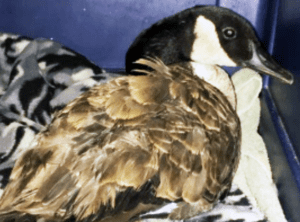 On Wednesday, June 14, around 9:30 a.m., witnesses say a man in a white car appeared to intentionally strike a family of nine geese as they were crossing the road near Jo Allyn Lowe Lake.
On Wednesday, June 14, around 9:30 a.m., witnesses say a man in a white car appeared to intentionally strike a family of nine geese as they were crossing the road near Jo Allyn Lowe Lake.
All but one were killed as a result of the attack.
“The witness said the guy that did it looked like he was laughing,” Animal Control Officer Charles Aubrey told the Examiner-Enterprise newspaper on June 15.
To date, the man who struck the geese has not been identified and no charges have been filed. Police say criminal intent might be difficult to prove in court, but nevertheless the case remains open and Aubrey is interested in learning the identity of the man in question. Anyone with information is asked to call the police department, 918-338-4001.
But despite the lack of information in the case, questions about the surviving goose’s status have persisted since a story about the incident was published in the local newspaper. A Monday visit to the Wild Heart Ranch, the wildlife rehabilitation facility to which the goose was taken, reveals the young goose, officially called a Canada Goose, has stabilized physically but is clearly traumatized.
“She has a dislocated hip but is expected to recover from her physical injuries,” Wild Heart Ranch volunteer Susan Lott said Monday. “But she is not happy. She only tolerates our help. And you can’t blame her — she’s used to being a wild animal, and now she’s not. We’re hoping she will calm down soon and start eating more; that will help.”
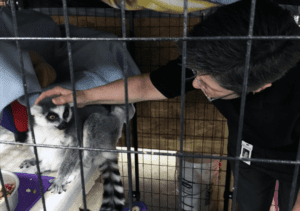 Lott said the goose has not been named, which is standard practice for animals that will ultimately be released.
Lott said the goose has not been named, which is standard practice for animals that will ultimately be released.
“It’s not good for the animal to get attached,” Lott said. “It can be a death sentence for them. If they walk up to the wrong person out in the wild, it can be very dangerous for them.”
Lott said the injured Bartlesville goose’s stay at the center will likely last several months, depending on how long it takes her hip to heal.
“Then we’ll find a safe place to release her,” Lott said.
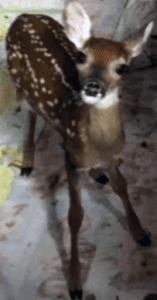 The 40-acre Wild Heart Ranch, located near Claremore, is a state and federally licensed non-profit that specializes in helping wild animals who are injured, orphaned or diseased. The center was started in 1996 by Annette King, who still serves as director. Daniel Hardt serves as assistant to the director. The facility is available 24/7 for wildlife (not domestic) emergencies.
The 40-acre Wild Heart Ranch, located near Claremore, is a state and federally licensed non-profit that specializes in helping wild animals who are injured, orphaned or diseased. The center was started in 1996 by Annette King, who still serves as director. Daniel Hardt serves as assistant to the director. The facility is available 24/7 for wildlife (not domestic) emergencies.
The animal population at the facility on any given day is upwards of 400 to 500 animals, often fluctuating based on birthing seasons, Lott said. Currently, just a smattering of the clientele includes Pat, a turkey so abused he was found with all of his feathers plucked out, the injured Bartlesville goose and a host of other birds, raccoons and orphaned fawns and skunks, including one litter that Aubrey delivered to the ranch from Bartlesville last week.
The center is also home to a few permanent guests — animals that cannot be released back into their natural habitats for one reason or another. These guests include Ramsey, a crow that was badly mangled after attempting to invade a squirrels’ nest, Keebler, a slightly overweight lemur who thrives on human attention, and the micro pig who turned out not to be micro at all, who spends her days rooting and foraging on the grounds. The ranch even has one informal member who invited himself to the party — Bambi, a red-tailed hawk, who comes around every morning to herd the deer.
“He’s free,” Lott says. “He just shows up every morning to herd the deer.”
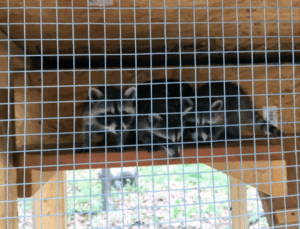 Some of these animal characters, not to mention an atmosphere created by the ranch’s dedicated staff and volunteers, could make it easy to forget the underlying mission and purpose of the organization — aiding and rehabbing the frightened, wounded, sick and traumatized animals who cannot care for themselves.
Some of these animal characters, not to mention an atmosphere created by the ranch’s dedicated staff and volunteers, could make it easy to forget the underlying mission and purpose of the organization — aiding and rehabbing the frightened, wounded, sick and traumatized animals who cannot care for themselves.
But Lott says there are things all of us can do to minimize this suffering, including refraining from purchasing animals as gifts, particularly seasonally sold animals such as ducks, geese and chicks at Easter time.
“Ninety percent of (these birds) don’t make it to their first birthday,” Lott said. “Animals are not gifts, they’re a commitment. If you want to give someone an animal as a gift, make it a stuffed animal.”
Feeding ducks bread is another mistake, Lott says.
“Bread can cause metabolic bone disease in ducks. They should not eat it,” she said.
Lott says it’s also important that people not attempt to rehab wild animals themselves. Not only is it a bad idea, it’s also illegal.
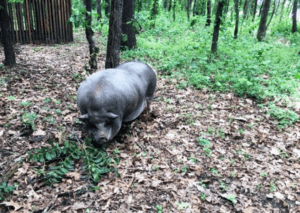 “All wild birds, with the exception of sparrows, starlings and pigeons, are federally protected, and all wild animals in Oklahoma are protected by the State,” Lott said. “Anyone coming across these animals has 24 hours (to get them to a licensed rehab facility) before it becomes a crime.”
“All wild birds, with the exception of sparrows, starlings and pigeons, are federally protected, and all wild animals in Oklahoma are protected by the State,” Lott said. “Anyone coming across these animals has 24 hours (to get them to a licensed rehab facility) before it becomes a crime.”
Lot said fines for violating these laws range up to $1,000 per animal.
What should be done when encountering injured or orphaned wildlife? Lott says to keep the animal — especially newborns — warm if possible, but don’t handle them any more than absolutely necessary. DON’T give them anything to eat or drink, and get the animal to a licensed rehab facility as soon as possible.
“They can call us or for advice or information, or they can call another licensed rehabber or a vet’s office,” Lott said.
Hardt and Lott are quick to point out, however, that Wild Heart Ranch does not transport animals to the facility.
“You would be surprised at the number of calls we get from people wanting us to come and get injured animals. We just can’t do that,” Lott said.
And, in the case of Bartlesville, specifically, Aubrey is not always available to transport wildlife to the facility.
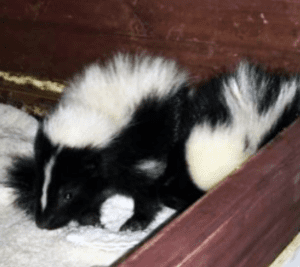 “We can’t possibly transport every injured or orphaned wild animal that is reported. We simply don’t have the manpower,” Aubrey said. “We do what we can, of course, but in general it’s up to individuals to get these animals to Wild Heart Ranch or another licensed rehab facility as soon as they can.”
“We can’t possibly transport every injured or orphaned wild animal that is reported. We simply don’t have the manpower,” Aubrey said. “We do what we can, of course, but in general it’s up to individuals to get these animals to Wild Heart Ranch or another licensed rehab facility as soon as they can.”
Aubrey said he hopes the incident last week will remind motorists to slow down and watch for all animals crossing the roadways, particularly on Price Road near Jo Allyn Lowe park, where geese can be found crossing on any given day.
“The speed limit through there is 45 miles per hour, but everyone really should be going a lot slower,” he said. “Always watch for animals crossing the road. They are like kids and never look before crossing. Anyone who does hit a wild animal is encouraged to call the police department. They will alert (animal control) so we can help the animal if needed.”
For more information about wildlife rescue, visit www.wildheartranch.org or www.wildlifedepartment.com. For local information, contact Aubrey at 918-338-4001.
